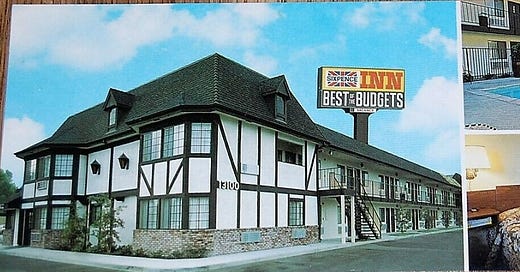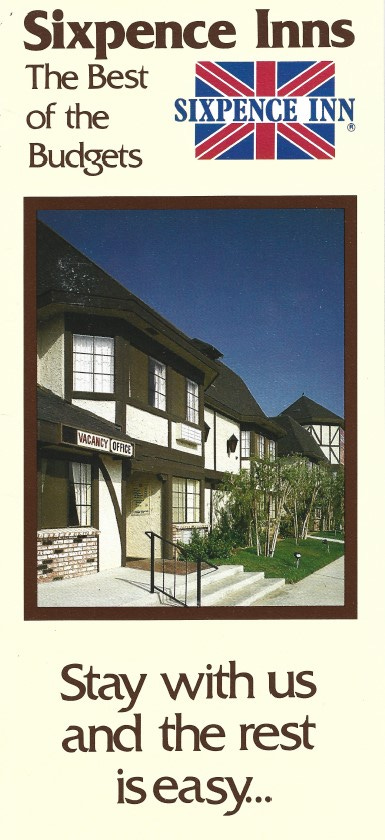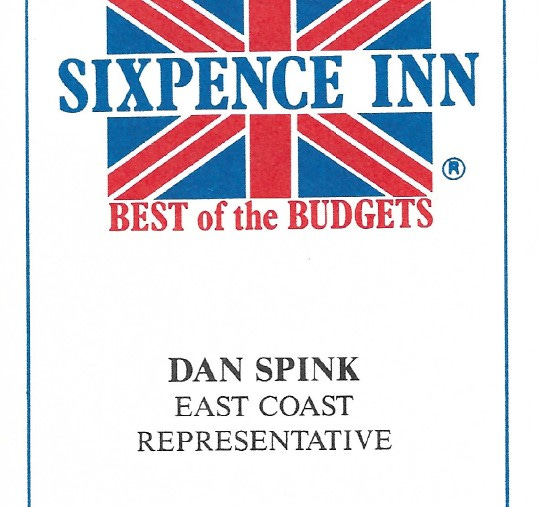My Motel Side Hustle
As my Y&R ad career slowly evolved, I suddenly had a new business opportunity emerge by reconnecting with an old friend, Don Sodaro. One day in 1971, a woman appeared at my home in Closter, NJ, to hand deliver a list of the attendees at our high school 20th reunion. Although I couldn’t attend, I looked through the list and immediately called Don’s home in California. We had been friends since high school and we both went to the University of Illinois. He was even in my fraternity at Illinois. I immediately called him and we agreed to meet for dinner in Los Angeles when I was next in L.A. to shoot a commercial, which turned out to be around a year or two later. At the dinner, I learned he had started his own budget motel chain and would like me to be a franchisee. I knew absolutely nothing about the motel business, but I trusted Don’s business savvy; he had a degree in Accounting plus his C.P.A. This is the story of how I became a player in his developing budget motel chain, Sixpence Inns of America.
Learning the Business
I had taken only the bare minimum number of business courses in obtaining my two degrees from Illinois, but Don was a good teacher. Using my vacation time at Y&R, I began my training by staying in one of his motels and learning the desk and routines on the job. Janet came with me.
Working as a part-time manager-in-training at Don’s motels was more than a business education; it showed me how a segment of the population I had no exposure to worked and lived. The maids, maintenance people, and desk clerks were usually hard-working and trustworthy. But the same could not be said of some of the guests. I learned that a few people went to motels to commit suicide, because they knew that they would be found and their bodies taken care of. I was surprised that a few guests were thieves, stealing whatever was not nailed down, and destructive for no apparent reason. They would dismantle the telephones or shower heads, perhaps just to surprise the next guests. But these were minor problems.
Prostitution was a much different kind of problem. When you hear that motels do not welcome ladies of the evening, you might be surprised because that might be a profitable kind of business, but Don’s company went to great lengths to prohibit that kind of traffic. The reason had nothing to do with morality. Prostitutes have all the wrong kind of associates and friends they bring with them; pimps, second-story men, drug dealers, etc.
Witnessing a Drug Bust
I will never forget the day, during my training at the Orange motel location in CA on Y&R vacation time, when the head maid came into the office to tell me we had a problem in one of the rooms on the second floor. “What’s the problem?” I asked.
“We’ve got either prostitution or drugs going on,” she replied calmly. “And I’m pretty sure it’s drugs.”
“How do you know?” I asked.
“There are both men and women coming and going,” she said. She could tell I was a little dumbfounded, so she gave me direction. “Just call the cops. I’ll keep an eye on the room until they get here.” I nodded and she walked back outside. I told the desk clerk, a girl in her teens, and she made the call. I couldn’t believe I was the only one who was nervous.
In less than 20 minutes, an old, beat-up Buick convertible rumbled up to the office, and two middle-aged tough-looking guys got out, both of them wearing loud, short-sleeved beach shirts. They came inside and introduced themselves as police detectives from the vice squad. I told them what the head maid had told me, and they said they weren’t surprised. They knew this motel had just opened a week ago, and, “Drug dealers like to find new motels, where they aren’t known, and then call their customers to come there,” they said. I could see both officers were armed when they turned and walked outside. I felt like I was in a gangster movie. Would there be shooting? I was nervous.
The take-down plan was simple. The teenage desk clerk called the drug trafficking room, and told them they had to leave because the room was rented to other people. Outside, I watched as two gruffy-looking weirdos, a male and a female, emerged from the room and slowly came down the stairs. It was hard to tell their ages, but they offered no resistance when the two cops stopped them and asked for their ID. Then the cops seemed to be talking to each other as they looked away from the couple. The female then tried to toss her large purse into the bushes behind her. That was what the cops were waiting for. They confiscated the purse and handcuffed them, putting them under arrest. One of the cops came inside the office with me and showed me the kerchief he had found in the purse. I was awed by drama and put my hand out to pick it up. The cop stopped me. “Don’t touch that kerchief. It’s got every disease known to man on it.” I felt very naïve, but thankful no one was hurt in the arrest.
Don Proposes I Become a Franchisee
I soon found out that Don wanted me to be his first franchisee and finance a Sixpence Motel near my home in New Jersey. He explained I would probably have to mortgage my house to raise the money, but when I eventually had three franchised Sixpence Inns, I wouldn’t have to worry about money again. That sound great, but I was a long way from setting up my first Sixpence Inn in the East.
Don found a Howard Johnson’s motel in New Paltz, New York, he thought I could buy and we would convert it to a Sixpence Inn. Don and I drove up to inspect it together, and he wanted me to negotiate a price for the lease that Howard Johnson’s owned on the property. But it was not what Don called, a “Doable Deal” - meaning I couldn’t financially do it. Don began to have second thoughts then about franchising in general. He wanted me managing motels for him in the East, but he realized he would have to continue building from scratch; in short, he would have to find a site, buy or lease the property, then design and build a Sixpence Inn the way he had already done many times. He now wanted me to help him find and obtain the site of the new motel.
I looked at his successful prototype layout. A motel on a major highway with high volume traffic, and a restaurant serving breakfast close by. I looked at different sites in New York, New Jersey, and Connecticut and realized that the most likely place to find his prototype layout at an affordable price for Sixpence was in Connecticut. Don and I bounced around Connecticut and we finally came across a real possibility at an intersection in Southington, Connecticut. But there was a lot of work to do and that became my focus on weekends and whatever time off I could get from my job at Y&R in New York.
The Southington Sixpence Inn
Lucky Dan got lucky again. The pieces began to come together as I went around doing my due diligence. The owner of the site property was an Italian bean farmer by the name of Mr. Zarrella. Around 1960, the Federal Highway System had decided to build I-84 directly through his bean farm where I-84 intersected with Route 10 at what would become Exit 34. For Mr. Zarrella, it was like winning the lottery. By the mid 1970’s, when Don and I came upon the scene, Mr. Zarrella was under the control of an attorney, Joe, who did not know much about how to maximize the financial value of the property, but was now in control of Mr. Zarrella’s decision-making. In other words, if I wanted to help Don obtain a lease on part of this property, I had to do a deal with Joe, an attorney I soon found out nobody liked.
The good news was that Don’s favorite restaurant partner, Denny’s, was also negotiating with Joe for a site, next to the site we wanted on Mr. Zarrella’s property. I met the Denny’s rep, Jay Funk, and I learned a lot from him as we both struggled to please Joe. For example, one of the big issues that always comes up in commercial lease negotiations was how to estimate and deal with inflation. Jay proposed a five percent “override” to solve all possible inflation events, and when Joe bought it, I made it a part of our Sixpence lease. Simply explained, at the end of each year, the total lease payment is calculated as a percent of the business’ gross. If it’s less than 5%, a one-time payment is made to bring it up to 5% of the leasee’s gross sales.
Dan Invests as a Limited Partner
At this time, limited partnerships were common. They allowed investors to invest in a business venture without risking a loss larger than their initial investment. I needed an attorney to fight my battles with Joe, and Don offered me a limited partnership in this Motel. I think I invested $15,000 and after six years got back almost $20,000. My investment was used to hire the attorney I brought up to Southington to negotiate with Joe. My attorney was the Mayor of Closter, Norton, a man I had helped get elected, so he was willing to help me out.
The first time I took Morton up to Southington to meet with Joe, I was surprised at how nice Joe was to my attorney. Later, my attorney explained that Joe always looked for the lowest common denominator. “What do you mean?” I asked. His answer caused us both to laugh. “We’re both Jewish”, he replied.
The Southington Lease Is Signed
The battle for Joe’s approval was difficult beyond words at times. My friend, Jay, the Denny’s rep, almost got into a fist fight at one point. Joe was insulting and all the while, his client, Mr. Zarrella, was never present. Joe would always put the fear of God into the man, I was told, because Mr. Zarrella knew nothing about the legal or financial matters being discussed. He depended upon Joe to protect him. I was also told that Joe had his hand in his client’s pockets, but I didn’t know the details. This is probably an all-too-common scene in rural America.
By 1978, I had persisted, but was on the verge of losing hope. Then, on Christmas Eve, as snow was beginning to fall in my quiet suburb of Closter, NJ, I got a phone call from Joe. He wanted me to come to his office. I drove there in the early evening and was surprised to see Mr. Zarrella sitting with Joe in his office. As usual, Joe made a demeaning joke as he looked out his window to my used Chevy station wagon parked on the street below in front of his office. “Well, I don’t’ see much asset value beyond your car,” he grinned. I said nothing. Then he reached in his desk and drew out the last lease I had submitted. He handed it to Mr. Zarrella and told him to sign it. He did. Then he handed me the lease and told me to get Don to sign it. I took the lease, thanked them both, and departed.
All the way back home, I wasn’t sure I actually had a signed lease to give Don. When I got back home, I called Don, expecting him to simply tell me to send it to him FedEx. Instead, he was ecstatic. “Dan, do you realize that you’re the only other employee of Sixpence, besides me, that has ever gotten a land lease signed?” I took a deep breath and smiled. No, I didn’t know that. I realized now, I was officially a member of the Sixpence team. I had a part time job with a future, in addition to my advertising job. It was something like an unexpected Christmas gift.
Getting the Bank Loan
The next step was getting a bank loan, and Don brought me into that process as well. This was becoming a real education in business I never had in college.
In brief, the construction loan comes first, and then the long-term mortgage loan. I had obtained home mortgage loans and car loans, but never a commercial bank loan. The requirements are based on your net worth, the proven value of the business, and your ability to convince the bankers you know what you’re doing. During the next two years of applying to different banks, I discovered that Don knew what he was doing by this point, and I would never have been able to get any loans on my own. One requirement you quickly learn in this struggle is that banks won’t lend you money to start a business unless you don’t need it; in other words, do you have a net worth big enough? Two other things I learned were; bankers can be biased about a type of business, including budget motels, and bankers have their own language. Don hired an ex-banker to write the application for the Southington loan for that reason. We finally got a loan because, in Don’s words, “The banker thought he was carving a fat hog,” if you get my meaning. What Don meant was, the banker thought he got a nice profit from a company that could afford to pay it.
Building the Motel
The building step required Don’s extensive know-how as a motel developer. Plans were developed for the Southington property from prototype plans provided by Don’s architects in California. I monitored the approval of the Southington building department and there were several problems. The local architect wasn’t doing his job. Don came out and had to have what I call a “Come-To-Jesus” meeting, to bring him back in line. The construction teams were hired locally, and because they were new to Sixpence Inns, had to be dealt with one by one. At one point Don had to fly to Rhode Island to obtain a complex stoplight the town required. But finally, the construction was finished.
The Final Steps: Furnishing and Opening
Don ordered all the F.F.& E. (Furniture, Fixtures, and Equipment) and made sure it was delivered on time to prepare all the rooms for the opening. It’s amazing how many details have to be checked. Fortunately, Don had the experience and energy to put it all together in time for the planned opening; the first Sixpence Inn on the East Coast.
The opening in 1980 was a record event in my life which will be told shortly in a separate story. In the meantime, I had to go back to Y&R and figure out how to make my life come together better. My Y&R job, wasn’t going well at all at this point. You’ll learn more about that next week, so stay tuned.






